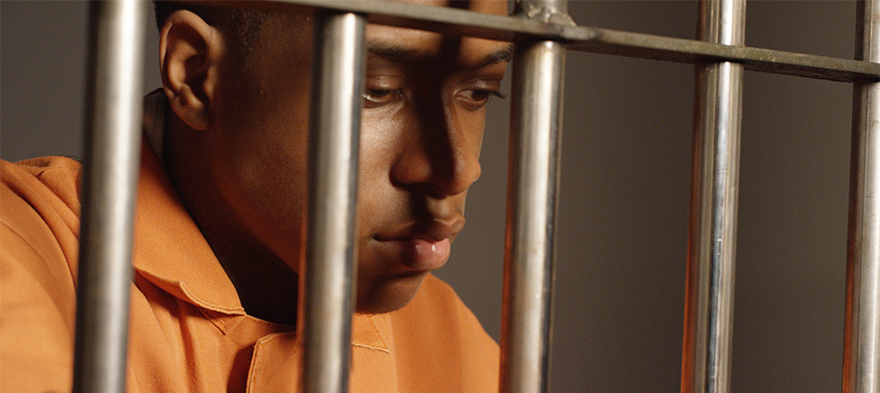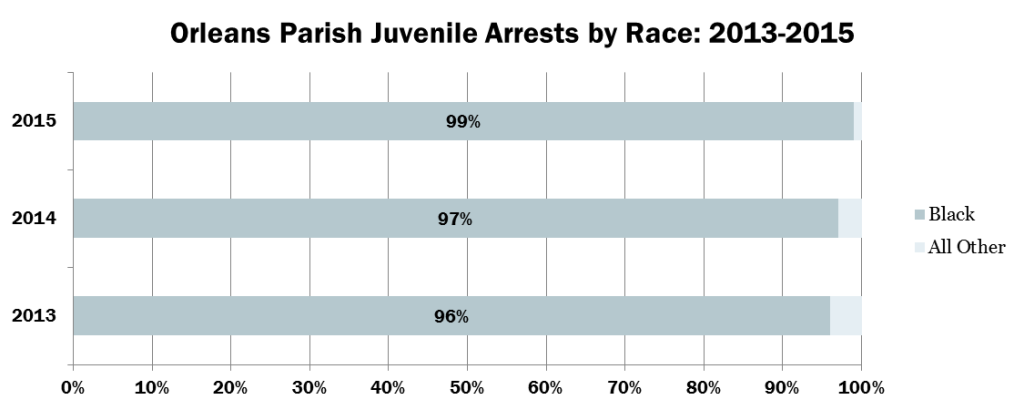
Oct 19, 2016 12:00:00 AM
 And if my experience today sitting in this courtroom is any indication, that seems to be playing out here in New Orleans. I watched teenager after teenager enter the judge’s chambers. All but three were Black. I found myself wondering if those three had been taking from their schools in an unmarked car. I wondered if they would be released or remanded. I wondered about a lot of things. Then out walked that young man who I spend my days high fiving and nudging along to class; that young man who lights up and smiles when he sees me. Except this time, there was no smile. And despite the bright orange jumpsuit, there was no brightness emanating from him today. Just shame. He held his head low. I imagine deep down inside he was happy to see me, but he couldn’t show that. He was just a scared boy. Upon being released on a signature bond, he emerged from the confinement of security in tears. My heart broke. But I reminded myself, I’m here for support. So I reminded him and his family to celebrate that instead of being remanded, he will head home with them. Now out of the orange jumpsuit, I noticed he was still wearing his school uniform. He asked me if I’d be heading back to school. This made me sad. Here was a student who didn’t get into trouble at school. A student who felt safe at school and wanted to return with me. Thankfully, he will get to return to school but there will be more court appearances and the uncertainty of what his future will be. Perhaps a silver lining, if there is one at all, is that he says he’s happy he’ll be able to return to school and has expressed being committed to working harder than ever. He’s grateful. And, so, here I am. I find myself moving deeper into thought about what’s happening with our Black boys. What they face, what they see, what they know. And the truth is, our kids confront so much in their personal lives that neither you nor I can even imagine. The harsh realities of their lives outside of school coupled with the structures and boundaries placed on them during the school day can make school feel impossible for some. For many of our boys, school is a world that is completely different from the one in which they wake up and go to bed. And still, they show up each day and do their best. And while
their best may not always match up to our expectations of what one’s best should look like, these boys are resilient and remarkable.
And if my experience today sitting in this courtroom is any indication, that seems to be playing out here in New Orleans. I watched teenager after teenager enter the judge’s chambers. All but three were Black. I found myself wondering if those three had been taking from their schools in an unmarked car. I wondered if they would be released or remanded. I wondered about a lot of things. Then out walked that young man who I spend my days high fiving and nudging along to class; that young man who lights up and smiles when he sees me. Except this time, there was no smile. And despite the bright orange jumpsuit, there was no brightness emanating from him today. Just shame. He held his head low. I imagine deep down inside he was happy to see me, but he couldn’t show that. He was just a scared boy. Upon being released on a signature bond, he emerged from the confinement of security in tears. My heart broke. But I reminded myself, I’m here for support. So I reminded him and his family to celebrate that instead of being remanded, he will head home with them. Now out of the orange jumpsuit, I noticed he was still wearing his school uniform. He asked me if I’d be heading back to school. This made me sad. Here was a student who didn’t get into trouble at school. A student who felt safe at school and wanted to return with me. Thankfully, he will get to return to school but there will be more court appearances and the uncertainty of what his future will be. Perhaps a silver lining, if there is one at all, is that he says he’s happy he’ll be able to return to school and has expressed being committed to working harder than ever. He’s grateful. And, so, here I am. I find myself moving deeper into thought about what’s happening with our Black boys. What they face, what they see, what they know. And the truth is, our kids confront so much in their personal lives that neither you nor I can even imagine. The harsh realities of their lives outside of school coupled with the structures and boundaries placed on them during the school day can make school feel impossible for some. For many of our boys, school is a world that is completely different from the one in which they wake up and go to bed. And still, they show up each day and do their best. And while
their best may not always match up to our expectations of what one’s best should look like, these boys are resilient and remarkable.
Danielle Sanders is a school behavior interventionist in New Orleans, Louisiana. She is responsible for implementing restorative practices as a behavioral intervention to support scholars when demonstrating behaviors that are not in line with school culture. Danielle blogs about education in Louisiana at Second Line Blog.
Few issues in education spark more tension and debate than standardized testing. Are they a tool for equity or a burden on students? A necessary check on school systems or a flawed measure of...
Charter schools are public schools with a purpose. Operating independently from traditional school districts, they're tuition-free, open to all students, and publicly funded—but with more flexibility...
Despite the benefits of a diverse teaching force, prospective teachers of color fall out of our leaky preparation pipeline at every stage: preparation, hiring, induction, and retention. Here’s what...
Ed Post is the flagship website platform of brightbeam, a 501(c3) network of education activists and influencers demanding a better education and a brighter future for every child.
© 2020-2025 brightbeam. All rights reserved.
Leave a Comment